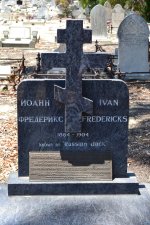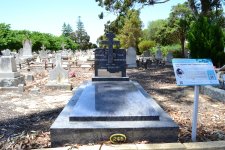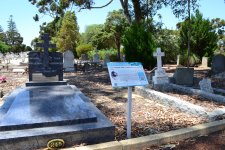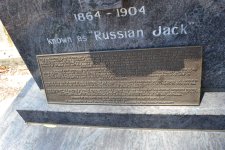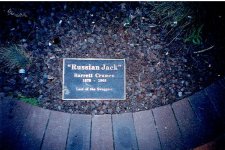Aleksandr R
Местный
RUSSIAN JACK
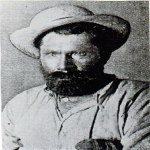 “ … the strongest man in Australia …”
“ … the strongest man in Australia …”
Outside the Halls Creek shire office in the far north-western outback country of Western Australia, is the sculpture of a man called “Russian Jack”, believed at one time to be “the strongest man in Australia.”
Even today, more than 90 years since his death, the great shadow of this immigrant pioneer of the West Australian goldfields looms over our evolving folklore like the presence of a giant, waiting for recognition which is a long time in coming.
To our shame, he rests largely forgotten in a pauper’s grave without a headstone or commemorative plaque.
So how did such an unusual Russian find his way from a frozen White Sea coastal city in Northern Russia to the sun-blasted North Western regions of West Australia?
In a geographical sense, Russian Jack was a highly unlikely immigrant whose origins, unfortunately, are unknown, and may ever remain so.
Always a restless traveller, Russian Jack was a frequent visitor to most of the rowdy inland gold camps of outback West Australia and was a well-known character everywhere.
The $18,000 Halls Creek sculpture depicting Russian Jack by Perth artist, C. P. Somers was unveiled in 1979 as a tribute to the tough old prospector of the late 1800s.
Ironically, in spite of being an alleged Russian immigrant, big Jack was, obviously, perceived by his peers as being typical of the type who personified the great Australian tradition of Mateship for the statue’s inscription reads: “His feat symbolised the mateship and endurance of the pioneers of the region, then lacking all the amenities of civilisation.”
While alive, Russian Jack’s loyalty to his fellow workers was legendary and, since his death, his reputation has become emblazoned in West Australian folklore.
Sadly, his life story has yet to be written for the benefit of generations to come; his magnificent adventures are lying scattered in many dusty books and newspaper articles, begging the attention of a researcher.
The Russian Jack statue financed by a $12,000 grant from the West Australian government and $6,000 from the shire of Halls Creek stands about two metres high, in two metres in length and one metre wide, weighing about two tonnes: a grand monument to a magnanimous spirit.
Definitely a larger-than-life character, Russian Jack has already, in a short period of time, acquired the aura of a myth or folk hero, and it is sometimes difficult to separate the fact from fiction when collating his exploits, many of which are only preserved in oral history.
Jack in believed to have been born in the historic town of Arkhangelisk (Archangel) in Russia, in 1864.
His purported English name is understood to have been John Frederick Kirkoss, though, of course, this might well have been a nom-de-plume.
He arrived in Derby, in West Australia, in 1886, aboard the State-owned ship, “Afghan”, when aged 22 years.
Therefore, having died when 40 years old, his extraordinary exploits on the early West Australian goldfields covered a mere 18 years.
Those who knew him described Russian Jack “as a magnificent specimen of manhood.”
He was said to stand about two metres tall, with a 122 cm chest.
At one stage he he was known as the “Murchison Hercules” due to his extraordinary exhibition of strength.
A good friend remembered Jack as a powerful man just under six feet and about 16 stone (about 100 kgs) in weight; his forearms as thick as the thigh of an ordinary man.
“He didn’t know his own strength. He had occasional drinking bouts, but was always a gourmand (glutton).
“Three pounds (1.5kg) of steak, a dozen eggs, a loaf of bread and a pound of butter would disappear in no time, and he would still be hungry. He enjoyed emu eggs. There was a ‘terrible lot of eating in them,’ he would say.”
By another observer Jack was conversely described as “stumpy in body, grizzled of face, unable to write but able to curse, a gentleman to females and a lout to gentlemen.”
H. Wilson in “Gateways To Gold” wrote: “Russian Jack was reputed to be an exceptionally strong and powerful man, over seven feet tall. When he leant over to whisperto the barmaid … all the glasses shook.”
In the small town of Derby, Russian Jack constructed for his own use an abnormally large wheelbarrow, with shafts 214 cm long, and an especially fashioned wide wheel (which he illegally obtained from an unidentified source) to make it easier to negotiate the deep sand dune country of the outback areas where he went in search of gold, often pushing loads in excess of 50 kilograms through sandy deserts.
The wheel was set about two-thirds the length of the shafts, one report said.
When Jack and a mate were halfway to the Kimberley country, his companion fell ill. Jack loaded his mate’s swag and stores onto his barrow, allowing the sick man to walk alongside.
Having travelled 64 kms , his friend was obviously too sick to walk any further, so the big Russian put him on top of the load and wheeled him along the track until he died. Jack then buried his body beside the road and continued the journey alone.
During one of his first overland jaunts, the big Russian came across two elderly prospectors who were too exhausted to carry their swags any further and were resting in the shade of a tree waiting for death to rescue them from their suffering. Russian Jack quietly loaded all their gear on to the already over-burdened wheelbarrow and helped push the weary diggers to the nearest settlement, 60 kms away, over waterless plains.
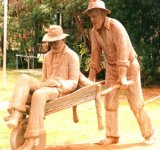
During the latter part of the journey, one of the old men collapsed and had to be loaded on to Jack’s wheelbarrow for transporting to the nearest township.
On yet another occasion Russian Jack saved another stricken gold prospector , displaying his characteristic great kindness and good nature – that is, when sober.
The stricken man, named Halliday, was lying semi-conscious beside a lonely track in the Kimberley region, near Fitzroy Crossing, a victim of typhoid fever. Russian Jack assisted the ailing man on to his loaded wheelbarrow and pushed him and their combined camping gear across 320 kms of heart-breaking, sun-baked country to the tiny township of Halls Creek where the sick man was given the necessary medical treatment and lived to tell the tale.
In 1907, the eccentric journalist, Daisy Bates, while travelling overland to the Murchison area, met the big Russian.
She wrote: “About 25 miles (40 kms) from the Peak Hill goldfields, we had stopped our buggy to wait and rest when out from a bush camp stepped a big, burly man with a huge melon in his hands , and from his mouth boomed the words, ‘Melon very good, lady. You like rest and eat?’
“In a moment I thought of Russian Jack and, sure enough, it was he. But no answer would he give to my question about his work or love for his mate; all I could persuade him to say was, ‘That was long time ago. It was nothing.’
“His mate had married and settled down , and Jack was cultivating a vegetable garden for the Peak Hills goldfields, and was in charge of the coach horses plying between the gold area and the coast.
“Still he kept his good name with everybody and helped many a down-and-outer … In honesty, in singleness of purpose, in the clean simplicity of his life and religion, this Russian Jack was a great name, but greatness in his ideal of the real friendship that means so much where men are thrown together far back in a continental interior like Australia.”
Another recorded incident concerns Russian Jack and a mate returning from an unsuccessful prospecting venture inland when their food supply ran dangerously low and they decided to shoot a kangaroo to help feed themselves along the track. Jack’s mate spotted a kangaroo and decided to chase it on foot. Unfortunately, he tripped and broke a leg. In typical fashion, Jack lifted his injured mate onto his wheelbarrowand pushed him to safety.
When the pair eventually arrived in town, one of the locals mentioned that Jack must have travelled over a certain rough track, one noted for its pot holes and gullies.
Jack told his admiring on-lookers: “I pushed him over a hundred miles (160 kms) in that damn wheelbarrow.”
The man with the broken leg, from Russian Jack’s wheelbarrow, remarked drily: “Yes, and I’ll swear so far he hasn’t missed a rock.”
While working at a Mt. Morgan gold mine, Jack fell down a jagged open cut excavation while strolling through the bush in the darkness. Three days later other prospectors found him; he was 21.4 metres below the ground surface, cut and fly-blown, and his only comment was to his rescuers: “I’ve missed a shift.”
In a preserved photograph of Russian Jack’s wheelbarrow, held by a Perth archive, is revealed a well-constructed vehicle about two metres in length. The wheel appears to be the cut section of a thick log, bored through the centre, and is almost as long as the barrow is wide, possibly 12 centimetres thick, providing excellent traction on sand. The long, low wheelbarrow with straight shafts resembles a sled and it would most assuredly have been easier to pull than to push.
On the early goldfields of Halls Creek and Cue, the name of Russian Jack quickly acquired the aura of a legend. An article appearing in the “Murchison Times” newspaper noted: “Our old friend, Russian Jack, whose memorable feats wheeling a heavily-laden wheelbarrow all the way from the … coast to the Kimberley goldfields … has returned to Cue …”
Russian Jack, it is recorded, was one of the earliest arrivals on the Murchison goldfields. He was also one of the first visitors to Cue at a time when it consisted only of a scattering of tents and makeshift buildings.
The only police “station” were two tents and a makeshift yard for the police horses. It was decided, therefore, to secure a large tree stump from Milly Soak and transport it on a waggon back to Cue. The log was set up near the police tents. To it was fastened a strong chain. That was the Cue Gaol. Offenders were secured to it for the term of their imprisonment.
While prospecting in the area, Russian Jack one time came into town for provisions. As was his habit, he also stopped at the hotel for one beer too many. When the time arrived for Jack to return to his prospecting site 8 miles out of town, he hastily threw on to his great wheelbarrow all his groceries, a bag of potatoes, drilling gear and explosives. His dynamite was secured in a wooden box, but a tin of 50 firing caps – extremely sensitive objects – were casually thrown on top of the unweildy load. Jack tied nothing down.
Everything on his wheelbarrow was carelessly arranged. With the slightest mishap, the firing caps could easily explode, causing severe damage or worse. Jack did not care. He was happily drunk.
Some observers on the main street watched apprehensively as Russian Jack effortlessly took up the shafts of his great wheelbarrow and uncertainly tried to push it in the right direction. But, being inebriated, he progressed haltingly, weaving all over the road.
A policeman, observing Jack’s erratic steps, remarked to a companion: “Russian Jack has a load up inside as well as on his barrow ,” and decided to to intervene by escorting him safely out of town.
Along the way, however, the policeman spotted the tin of firing caps balanced precariously on top of the load. Jack informed the constable he had recently received some money for gold nuggets sent to the bank, and was intent on proceeding to his mine, the “Fairlight,” about 12.8 kms away.
For his own safety, the lawman decided to arrest Russian Jack but was uncertain how to do this, as the big Russian was an unusually strong man and had to be handled cautiously at the best of times. Jack continued staggering all over the road, bellowing out a song in his raucous, booming voice. AS he drew near the police tents, several policemen intercepted Russian Jack, suggesting quietly that he should re-pack his barrow. Ever so diplomatically, the police offered the big man a cup of tea as, together, they planned their course of action in getting the drunken Russian safely out of town and back to his bush camp.
By this time Jack was thirsty again and he agreed to sit down quietly for a spell. As Jack rested, he started to doze off. The police re-packed his barrow securely while waiting for the billy to boil. Soon Russian Jack was fast asleep, so the policemen handcuffed the big man to the huge log, their intention being to restrain him until he had sobered and was capable of undertaking a safe journey back to his camp in the bush.
Overnight, the policeman was summoned urgently out of town to Cuddingwarra, about ten miles to the west. In his concentration, the policeman completely forgot about Russian Jack being chained to the large log near the police tents. Later in the day the policeman suddenly remembered the big drunken Russian he had left behind at Cue , chained to a log.
Riding quickly back, the policeman was stunned to find that Russian Jack was gone. So was the log!
The great stump had been bodily uplifted, and there were dragging marks on the ground for several metres. It would have taken four men to lift the log, he reasoned, so perhaps some of the residents had moved the log and Jack to a shadey place out of the sun.
When the policeman conducted a quick search of the town site, at the hotel he discovered Russian Jack sitting quietly at the bar having a conversation with the publican. The log was propped up on the counter and Jack was still chained to it.
It was learnt that Jack had awakened during the night with a terrible thirst. He could see a waterbag hanging inside one of the police tents. Jack called out for a drink but, when there was no response, he heaved the great log up on to his shoulder and walked to the tent. He then promptly emptied the waterbag. Satisfied, he went back to sleep.
When he next awakened, it was daylight, and the merciless sun was beating down on him with a vengeance. Famished for a drink, and not particularly fussy how he obtained it, the big Russian wrenched the tree stump from the ground, balanced it on a shoulder, and walked away in search of refreshment at the nearest pub which was a quarter of a mile away.
When the hotel opened its doors, there was Russian Jack, chained to a log, asking for a cool ale to prevent him dying of thirst.
“I thought I left you in gaol, Jack,” the policeman said.
“So you did,” Jack replied, “but it was low-down of you to leave me all night with no drink. Anyway, you have one drink with me now and I’ll go back to gaol.”
With an amazed police office in tow, Russian Jack again shouldered the gaol log and casually strolled back to the police tents where he restored the makeshift “gaol” to its original location
At the police camp the officer removed Jack’s chain and put a billy on the campfire which they shared.
The policeman said to him: “You had better go back to your show (goldmine) and next time you want to have a few pots, don’t buy explosives at the same time.”
Later Jack gratefully thanked the police for preventing him leaving town with his firing caps unsecured.
Jack’s physical strength was known to be immense and many were the stories told of his magnificent feats.
At one time, when working at Doorawarrah Station, he was dismissed by his employer for wrecking equipment. Jack allegedly bent a .4 cm octagonal crowbar over his knees in an angry moment.
On another goldfield, at Peak Hill, Russian Jack one time operated a crude eating house. With a manure heap nearby, millions of flies were usually added to a meal of damper (crude bush bread) and tea. A Frenchman, Albert Duclos, set up his camp close to Russian Jack’s business, hoping to steal some of his customers. AS the two men were already enemies, Jack took quick action; he chased the Frenchman with a meat chopper. threatening to “make him the mince meat.”
Duclos escaped from the enraged Russian, but thereafter kept a respectable distance between them.In his grubby eating house the big man waited on his customers, all of them rough gold diggers, without ever wearing boots and with his unwashed trousers rolled up to his knees.
Russian Jack was said to have had a hand the size of a leg of ham, and he sported an unruly black beard.
A passing Cobb &Co. coach driver once paused outside Jack’s premises to offer him a drink from a half full bottle of whiskey.
“No, thanks,” said Jack. “I’m not drinking now.”
When the offer was repeated, Jack grudgingly consented to “half a sip.”
He poured the half bottle of whiskey into a mug (metal cup) and swaqllowed the lot in one swift gulp.
When the coach driver saw his empty whiskey bottle, he muttered: “Well, if he’s not drinking, I’d hate to see him when he was.”
One time Jack was asked what he would most like to achieve in his life. He said he would like to retire near a city in West Australia, grow lots of vegetables, then sit down by himself and eat the lot.
According to the official burial report, Russian Jack died in a private hospital, Mandurah Road, at Fremantle, West Australia, on April 17,1904, aged 40 years, after succumbing to a severe bout of pneumonia. He was buried two day’s later in a local cemetery in the public grave section, lot 245.
His burial particulars state his parent’s names were “unknown,” with a Roman Catholic “minister”, John Smythe, officiating at the burial in the “Roman Catholic Cemetery, Fremantle,” and also recorded as “unknown” is whether John Frederick Kirkoss was married or had children.
Unfortunately, no headstone marks the site.
Soon after his death, a Fremantle newspaper carried a report of his passing.
“An old identity, John Fredericks – but a hundred times better known as ‘Russian Jack’ – died a few days ago. His death came as a surprise for no one could imagine death in the prime of life to one of such herculean strength. He was, so far as physical manhood is concerned, a picture, but he combined the strength of a lion with the tenderness of a woman. Though he had a loud-sounding sonorous voice that seemed to come out of his boots, there was no more harm in it than the chirp of a bird. Many instances are known of his uniform good nature, but his extraordinary kindness, some years ago, to a complete stranger – that he picked up on the track in the Kimberley gold rush exemplified his mateship. The stranger had a wheelbarrow and some food, and the burly Russian picked the stranger up, placed him on his own large wheelbarrow, together with his meagre possessions, and wheeled him nearly 300 miles (480 kms) to a haven of refuge.”
Jack was interred in a public grave – i.e., a pauper’s grave – in section CC. no. 245, at Fremantle. With not even a common headstone to mark the site of one of West Australia’s most colourful pioneers.
His death certificate records his profession as “market gardener,” revealing that the big man seemingly fulfilled his life-long ambition to have his own private vegetable supply.
In 1930 the grave was re-opened to admit the body of another unfortunate, William Mulloughney.
Following Russian Jack’s death in 1904, a Fremantle newspaper obituary said: “Russian Jack, if there are Angels in Heaven who record the good deeds done on earth, thou wouldst have sufficient to thy credit to wipe out the many faults that common flesh is heir to.”
© B.C. - Voices Of The Outback
 “ … the strongest man in Australia …”
“ … the strongest man in Australia …”Outside the Halls Creek shire office in the far north-western outback country of Western Australia, is the sculpture of a man called “Russian Jack”, believed at one time to be “the strongest man in Australia.”
Even today, more than 90 years since his death, the great shadow of this immigrant pioneer of the West Australian goldfields looms over our evolving folklore like the presence of a giant, waiting for recognition which is a long time in coming.
To our shame, he rests largely forgotten in a pauper’s grave without a headstone or commemorative plaque.
So how did such an unusual Russian find his way from a frozen White Sea coastal city in Northern Russia to the sun-blasted North Western regions of West Australia?
In a geographical sense, Russian Jack was a highly unlikely immigrant whose origins, unfortunately, are unknown, and may ever remain so.
Always a restless traveller, Russian Jack was a frequent visitor to most of the rowdy inland gold camps of outback West Australia and was a well-known character everywhere.
The $18,000 Halls Creek sculpture depicting Russian Jack by Perth artist, C. P. Somers was unveiled in 1979 as a tribute to the tough old prospector of the late 1800s.
Ironically, in spite of being an alleged Russian immigrant, big Jack was, obviously, perceived by his peers as being typical of the type who personified the great Australian tradition of Mateship for the statue’s inscription reads: “His feat symbolised the mateship and endurance of the pioneers of the region, then lacking all the amenities of civilisation.”
While alive, Russian Jack’s loyalty to his fellow workers was legendary and, since his death, his reputation has become emblazoned in West Australian folklore.
Sadly, his life story has yet to be written for the benefit of generations to come; his magnificent adventures are lying scattered in many dusty books and newspaper articles, begging the attention of a researcher.
The Russian Jack statue financed by a $12,000 grant from the West Australian government and $6,000 from the shire of Halls Creek stands about two metres high, in two metres in length and one metre wide, weighing about two tonnes: a grand monument to a magnanimous spirit.
Definitely a larger-than-life character, Russian Jack has already, in a short period of time, acquired the aura of a myth or folk hero, and it is sometimes difficult to separate the fact from fiction when collating his exploits, many of which are only preserved in oral history.
Jack in believed to have been born in the historic town of Arkhangelisk (Archangel) in Russia, in 1864.
His purported English name is understood to have been John Frederick Kirkoss, though, of course, this might well have been a nom-de-plume.
He arrived in Derby, in West Australia, in 1886, aboard the State-owned ship, “Afghan”, when aged 22 years.
Therefore, having died when 40 years old, his extraordinary exploits on the early West Australian goldfields covered a mere 18 years.
Those who knew him described Russian Jack “as a magnificent specimen of manhood.”
He was said to stand about two metres tall, with a 122 cm chest.
At one stage he he was known as the “Murchison Hercules” due to his extraordinary exhibition of strength.
A good friend remembered Jack as a powerful man just under six feet and about 16 stone (about 100 kgs) in weight; his forearms as thick as the thigh of an ordinary man.
“He didn’t know his own strength. He had occasional drinking bouts, but was always a gourmand (glutton).
“Three pounds (1.5kg) of steak, a dozen eggs, a loaf of bread and a pound of butter would disappear in no time, and he would still be hungry. He enjoyed emu eggs. There was a ‘terrible lot of eating in them,’ he would say.”
By another observer Jack was conversely described as “stumpy in body, grizzled of face, unable to write but able to curse, a gentleman to females and a lout to gentlemen.”
H. Wilson in “Gateways To Gold” wrote: “Russian Jack was reputed to be an exceptionally strong and powerful man, over seven feet tall. When he leant over to whisperto the barmaid … all the glasses shook.”
In the small town of Derby, Russian Jack constructed for his own use an abnormally large wheelbarrow, with shafts 214 cm long, and an especially fashioned wide wheel (which he illegally obtained from an unidentified source) to make it easier to negotiate the deep sand dune country of the outback areas where he went in search of gold, often pushing loads in excess of 50 kilograms through sandy deserts.
The wheel was set about two-thirds the length of the shafts, one report said.
When Jack and a mate were halfway to the Kimberley country, his companion fell ill. Jack loaded his mate’s swag and stores onto his barrow, allowing the sick man to walk alongside.
Having travelled 64 kms , his friend was obviously too sick to walk any further, so the big Russian put him on top of the load and wheeled him along the track until he died. Jack then buried his body beside the road and continued the journey alone.
During one of his first overland jaunts, the big Russian came across two elderly prospectors who were too exhausted to carry their swags any further and were resting in the shade of a tree waiting for death to rescue them from their suffering. Russian Jack quietly loaded all their gear on to the already over-burdened wheelbarrow and helped push the weary diggers to the nearest settlement, 60 kms away, over waterless plains.

During the latter part of the journey, one of the old men collapsed and had to be loaded on to Jack’s wheelbarrow for transporting to the nearest township.
On yet another occasion Russian Jack saved another stricken gold prospector , displaying his characteristic great kindness and good nature – that is, when sober.
The stricken man, named Halliday, was lying semi-conscious beside a lonely track in the Kimberley region, near Fitzroy Crossing, a victim of typhoid fever. Russian Jack assisted the ailing man on to his loaded wheelbarrow and pushed him and their combined camping gear across 320 kms of heart-breaking, sun-baked country to the tiny township of Halls Creek where the sick man was given the necessary medical treatment and lived to tell the tale.
In 1907, the eccentric journalist, Daisy Bates, while travelling overland to the Murchison area, met the big Russian.
She wrote: “About 25 miles (40 kms) from the Peak Hill goldfields, we had stopped our buggy to wait and rest when out from a bush camp stepped a big, burly man with a huge melon in his hands , and from his mouth boomed the words, ‘Melon very good, lady. You like rest and eat?’
“In a moment I thought of Russian Jack and, sure enough, it was he. But no answer would he give to my question about his work or love for his mate; all I could persuade him to say was, ‘That was long time ago. It was nothing.’
“His mate had married and settled down , and Jack was cultivating a vegetable garden for the Peak Hills goldfields, and was in charge of the coach horses plying between the gold area and the coast.
“Still he kept his good name with everybody and helped many a down-and-outer … In honesty, in singleness of purpose, in the clean simplicity of his life and religion, this Russian Jack was a great name, but greatness in his ideal of the real friendship that means so much where men are thrown together far back in a continental interior like Australia.”
Another recorded incident concerns Russian Jack and a mate returning from an unsuccessful prospecting venture inland when their food supply ran dangerously low and they decided to shoot a kangaroo to help feed themselves along the track. Jack’s mate spotted a kangaroo and decided to chase it on foot. Unfortunately, he tripped and broke a leg. In typical fashion, Jack lifted his injured mate onto his wheelbarrowand pushed him to safety.
When the pair eventually arrived in town, one of the locals mentioned that Jack must have travelled over a certain rough track, one noted for its pot holes and gullies.
Jack told his admiring on-lookers: “I pushed him over a hundred miles (160 kms) in that damn wheelbarrow.”
The man with the broken leg, from Russian Jack’s wheelbarrow, remarked drily: “Yes, and I’ll swear so far he hasn’t missed a rock.”
While working at a Mt. Morgan gold mine, Jack fell down a jagged open cut excavation while strolling through the bush in the darkness. Three days later other prospectors found him; he was 21.4 metres below the ground surface, cut and fly-blown, and his only comment was to his rescuers: “I’ve missed a shift.”
In a preserved photograph of Russian Jack’s wheelbarrow, held by a Perth archive, is revealed a well-constructed vehicle about two metres in length. The wheel appears to be the cut section of a thick log, bored through the centre, and is almost as long as the barrow is wide, possibly 12 centimetres thick, providing excellent traction on sand. The long, low wheelbarrow with straight shafts resembles a sled and it would most assuredly have been easier to pull than to push.
On the early goldfields of Halls Creek and Cue, the name of Russian Jack quickly acquired the aura of a legend. An article appearing in the “Murchison Times” newspaper noted: “Our old friend, Russian Jack, whose memorable feats wheeling a heavily-laden wheelbarrow all the way from the … coast to the Kimberley goldfields … has returned to Cue …”
Russian Jack, it is recorded, was one of the earliest arrivals on the Murchison goldfields. He was also one of the first visitors to Cue at a time when it consisted only of a scattering of tents and makeshift buildings.
The only police “station” were two tents and a makeshift yard for the police horses. It was decided, therefore, to secure a large tree stump from Milly Soak and transport it on a waggon back to Cue. The log was set up near the police tents. To it was fastened a strong chain. That was the Cue Gaol. Offenders were secured to it for the term of their imprisonment.
While prospecting in the area, Russian Jack one time came into town for provisions. As was his habit, he also stopped at the hotel for one beer too many. When the time arrived for Jack to return to his prospecting site 8 miles out of town, he hastily threw on to his great wheelbarrow all his groceries, a bag of potatoes, drilling gear and explosives. His dynamite was secured in a wooden box, but a tin of 50 firing caps – extremely sensitive objects – were casually thrown on top of the unweildy load. Jack tied nothing down.
Everything on his wheelbarrow was carelessly arranged. With the slightest mishap, the firing caps could easily explode, causing severe damage or worse. Jack did not care. He was happily drunk.
Some observers on the main street watched apprehensively as Russian Jack effortlessly took up the shafts of his great wheelbarrow and uncertainly tried to push it in the right direction. But, being inebriated, he progressed haltingly, weaving all over the road.
A policeman, observing Jack’s erratic steps, remarked to a companion: “Russian Jack has a load up inside as well as on his barrow ,” and decided to to intervene by escorting him safely out of town.
Along the way, however, the policeman spotted the tin of firing caps balanced precariously on top of the load. Jack informed the constable he had recently received some money for gold nuggets sent to the bank, and was intent on proceeding to his mine, the “Fairlight,” about 12.8 kms away.
For his own safety, the lawman decided to arrest Russian Jack but was uncertain how to do this, as the big Russian was an unusually strong man and had to be handled cautiously at the best of times. Jack continued staggering all over the road, bellowing out a song in his raucous, booming voice. AS he drew near the police tents, several policemen intercepted Russian Jack, suggesting quietly that he should re-pack his barrow. Ever so diplomatically, the police offered the big man a cup of tea as, together, they planned their course of action in getting the drunken Russian safely out of town and back to his bush camp.
By this time Jack was thirsty again and he agreed to sit down quietly for a spell. As Jack rested, he started to doze off. The police re-packed his barrow securely while waiting for the billy to boil. Soon Russian Jack was fast asleep, so the policemen handcuffed the big man to the huge log, their intention being to restrain him until he had sobered and was capable of undertaking a safe journey back to his camp in the bush.
Overnight, the policeman was summoned urgently out of town to Cuddingwarra, about ten miles to the west. In his concentration, the policeman completely forgot about Russian Jack being chained to the large log near the police tents. Later in the day the policeman suddenly remembered the big drunken Russian he had left behind at Cue , chained to a log.
Riding quickly back, the policeman was stunned to find that Russian Jack was gone. So was the log!
The great stump had been bodily uplifted, and there were dragging marks on the ground for several metres. It would have taken four men to lift the log, he reasoned, so perhaps some of the residents had moved the log and Jack to a shadey place out of the sun.
When the policeman conducted a quick search of the town site, at the hotel he discovered Russian Jack sitting quietly at the bar having a conversation with the publican. The log was propped up on the counter and Jack was still chained to it.
It was learnt that Jack had awakened during the night with a terrible thirst. He could see a waterbag hanging inside one of the police tents. Jack called out for a drink but, when there was no response, he heaved the great log up on to his shoulder and walked to the tent. He then promptly emptied the waterbag. Satisfied, he went back to sleep.
When he next awakened, it was daylight, and the merciless sun was beating down on him with a vengeance. Famished for a drink, and not particularly fussy how he obtained it, the big Russian wrenched the tree stump from the ground, balanced it on a shoulder, and walked away in search of refreshment at the nearest pub which was a quarter of a mile away.
When the hotel opened its doors, there was Russian Jack, chained to a log, asking for a cool ale to prevent him dying of thirst.
“I thought I left you in gaol, Jack,” the policeman said.
“So you did,” Jack replied, “but it was low-down of you to leave me all night with no drink. Anyway, you have one drink with me now and I’ll go back to gaol.”
With an amazed police office in tow, Russian Jack again shouldered the gaol log and casually strolled back to the police tents where he restored the makeshift “gaol” to its original location
At the police camp the officer removed Jack’s chain and put a billy on the campfire which they shared.
The policeman said to him: “You had better go back to your show (goldmine) and next time you want to have a few pots, don’t buy explosives at the same time.”
Later Jack gratefully thanked the police for preventing him leaving town with his firing caps unsecured.
Jack’s physical strength was known to be immense and many were the stories told of his magnificent feats.
At one time, when working at Doorawarrah Station, he was dismissed by his employer for wrecking equipment. Jack allegedly bent a .4 cm octagonal crowbar over his knees in an angry moment.
On another goldfield, at Peak Hill, Russian Jack one time operated a crude eating house. With a manure heap nearby, millions of flies were usually added to a meal of damper (crude bush bread) and tea. A Frenchman, Albert Duclos, set up his camp close to Russian Jack’s business, hoping to steal some of his customers. AS the two men were already enemies, Jack took quick action; he chased the Frenchman with a meat chopper. threatening to “make him the mince meat.”
Duclos escaped from the enraged Russian, but thereafter kept a respectable distance between them.In his grubby eating house the big man waited on his customers, all of them rough gold diggers, without ever wearing boots and with his unwashed trousers rolled up to his knees.
Russian Jack was said to have had a hand the size of a leg of ham, and he sported an unruly black beard.
A passing Cobb &Co. coach driver once paused outside Jack’s premises to offer him a drink from a half full bottle of whiskey.
“No, thanks,” said Jack. “I’m not drinking now.”
When the offer was repeated, Jack grudgingly consented to “half a sip.”
He poured the half bottle of whiskey into a mug (metal cup) and swaqllowed the lot in one swift gulp.
When the coach driver saw his empty whiskey bottle, he muttered: “Well, if he’s not drinking, I’d hate to see him when he was.”
One time Jack was asked what he would most like to achieve in his life. He said he would like to retire near a city in West Australia, grow lots of vegetables, then sit down by himself and eat the lot.
According to the official burial report, Russian Jack died in a private hospital, Mandurah Road, at Fremantle, West Australia, on April 17,1904, aged 40 years, after succumbing to a severe bout of pneumonia. He was buried two day’s later in a local cemetery in the public grave section, lot 245.
His burial particulars state his parent’s names were “unknown,” with a Roman Catholic “minister”, John Smythe, officiating at the burial in the “Roman Catholic Cemetery, Fremantle,” and also recorded as “unknown” is whether John Frederick Kirkoss was married or had children.
Unfortunately, no headstone marks the site.
Soon after his death, a Fremantle newspaper carried a report of his passing.
“An old identity, John Fredericks – but a hundred times better known as ‘Russian Jack’ – died a few days ago. His death came as a surprise for no one could imagine death in the prime of life to one of such herculean strength. He was, so far as physical manhood is concerned, a picture, but he combined the strength of a lion with the tenderness of a woman. Though he had a loud-sounding sonorous voice that seemed to come out of his boots, there was no more harm in it than the chirp of a bird. Many instances are known of his uniform good nature, but his extraordinary kindness, some years ago, to a complete stranger – that he picked up on the track in the Kimberley gold rush exemplified his mateship. The stranger had a wheelbarrow and some food, and the burly Russian picked the stranger up, placed him on his own large wheelbarrow, together with his meagre possessions, and wheeled him nearly 300 miles (480 kms) to a haven of refuge.”
Jack was interred in a public grave – i.e., a pauper’s grave – in section CC. no. 245, at Fremantle. With not even a common headstone to mark the site of one of West Australia’s most colourful pioneers.
His death certificate records his profession as “market gardener,” revealing that the big man seemingly fulfilled his life-long ambition to have his own private vegetable supply.
In 1930 the grave was re-opened to admit the body of another unfortunate, William Mulloughney.
Following Russian Jack’s death in 1904, a Fremantle newspaper obituary said: “Russian Jack, if there are Angels in Heaven who record the good deeds done on earth, thou wouldst have sufficient to thy credit to wipe out the many faults that common flesh is heir to.”
© B.C. - Voices Of The Outback
